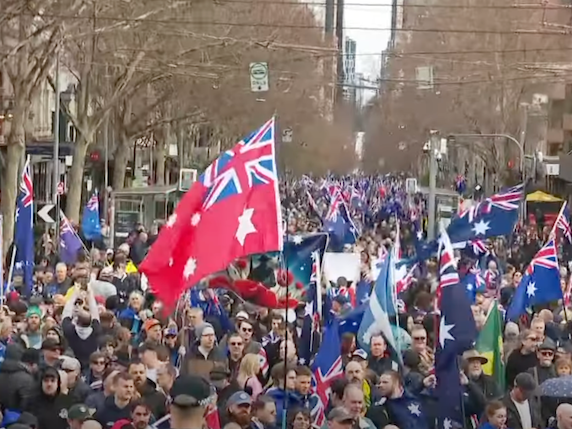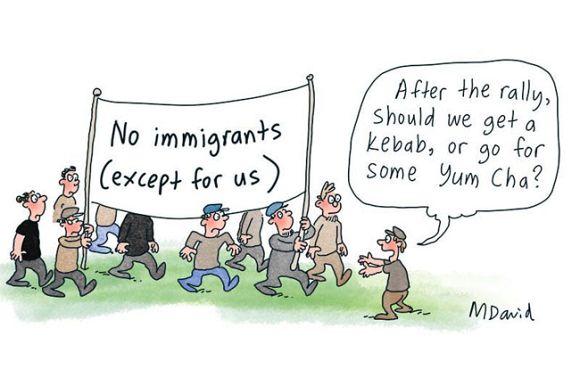Rising inequality is being exploited by right-wing populism, putting Australians at risk of becoming further disenfranchised, writes Carl Rhodes.
WHEN THE LABOR PARTY won the federal election in May, many Australians saw it as a rejection of Peter Dutton’s brand of right-wing populism. He was even dubbed “Temu Trump“, a mocking reference to the discount retailer that portrayed him as a second-rate imitation of U.S. President Donald Trump.
Dutton’s defeat was hailed as proof that Australia had resisted the populist political currents that have gained ground in the United States and Europe. At the time, political commentators Tony Barry and Barrie Cassidy argued that the collapse of Dutton’s campaign was driven by the “Trump effect”, a backlash against political rhetoric rooted in hard-line conservatism, anti-immigration nationalism and culture war baiting.
Two weeks ago, as tens of thousands rallied in the streets under the banner of the March for Australia, it became clear that reports of populism’s demise were premature. The causes being marched for were anti-immigration, nationalism and anti-wokeness, reminiscent of Dutton’s own talking points from just five months earlier.
The populist appeal
The Labor Party condemned the march.
Minister for Multicultural Affairs Anne Aly said:
“This brand of far-right activism grounded in racism and ethnocentrism has no place in modern Australia.”
Prime Minister Anthony Albanese struck a more measured tone. He denounced the neo-Nazi presence at the rallies, but also downplayed the scale of the protest, noting that “they weren’t big numbers in the scheme of things.” He added that many attendees were “good people” expressing legitimate concerns about housing affordability and economic pressures.
Good people? The phrase carried an eerie echo of Donald Trump’s infamous remark that there were “very fine people” at the ‘Unite the Right‘ rally in Charlottesville, Virginia on August 2017. In both cases, neo-Nazis took to the streets, demonstrating how the far right can align with ordinary citizens – the good and fine people – to support racist and divisive political positions.
Fortunately, the March for Australia was not marked by the lethal violence seen in Charlottesville. The parallels between the two are nevertheless still chilling. By co-opting law-abiding working- and middle-class citizens, populists build support by offering radical solutions to a rhetorically inflamed crisis they claim mainstream politics cannot fix.
The crisis fuels the belief that the prevailing political order no longer represents the people and no longer deserves their consent and that radical alternatives are needed.
Why ‘March for Australia’?
‘March for Australia’ was about animating a crisis and undermining the legitimacy of government. The “silent majority is silent no more”, the organisers declared on the website advertising the marches. Their rallying cry was:
Australia is changing in ways most of us never agreed to. People are waking up to a country they barely recognise. Endless migration, weak leadership, and political cowardice have brought us here, and it’s time to a put a stop to it.
Reverence for a mythical past. Ethno-nationalist grievance. Inflammatory rhetoric. Appeals to new authority. These are hallmarks historically associated with of fascist movements, deployed here to justify radical political action within a populist strategy.
While this strategy gains traction by presenting a crisis that is both incendiary and seditious, it builds on socio-economic problems that are very real and that have not been addressed by prevailing democratic norms and institutions. In the case of March for Australia, those problems, as Albanese correctly identified them, include economic, especially housing affordability.
It is damning that a survey conducted by global market research and public opinion company Ipsos earlier this year revealed that almost half of all Australians believe the country is in decline and that society is broken. Nearly two thirds hold the conviction that the economy is rigged to benefit wealthy elites and that politicians don’t care about them.
The populist answer to these very real grievances lies in scapegoating migration to explain why Australia has become a country “most of us never agreed to,” where increasing numbers of young people can no longer afford homes and where traditional values are perceived to be eroding.
The problem of vastly widening economic inequality is real. The failure of successive governments to address it is real too. But the racism that blames migrants for these problems is a populist exploitation of a genuine crisis. It is designed to co-opt “good people” into a destructive political agenda.
A call to action
The March for Australia rallies are a clarion call for political action against the very real threat of right-wing populism fuelled by rising economic inequality.
Unless Australia confronts the deepening crisis of economic inequality and the widespread sense of disenfranchisement it creates, we may find ourselves following in the footsteps of the “fine people” of the United States and elect an Aussie Donald Trump as Prime Minister.
Thankfully, we are not there yet.
The Economic Reform Roundtable, hosted by the Prime Minister and his Treasurer Jim Chalmers last month, signals that the government is keenly aware that economic inequality, the cost-of-living crisis and gross housing unaffordability are of significant concern across Australia.
But is the response enough?
Australia’s economic framework has long been tilted in favour of the wealthy. Generous tax concessions for capital gains, negative gearing and superannuation are corrosive. They entrench privilege, widen the wealth gap, and lock millions out of opportunity.
The Roundtable aimed to build consensus on improving living standards, but the outcome lacked the boldness needed for transformative change.
Despite compelling evidence that these concessions fuel inequality and housing unaffordability, Australia’s major parties remain hesitant to challenge the interests of wealthy investors, leaving effective reform to the margins of political debate. The business sector has steered the debate away from meaningful reform, stalling progress addressing unequal economic distribution.
Framing fundamental economic injustice as intergenerational inequality or a cost-of-living crisis diverts attention from the real economic crisis Australia is facing: a crisis of class-based inequality that is seeing an increasing number of Australians disenfranchised.
This is exactly the kind of disenfranchisement that populist politics preys on.
Now is the time for bold action.
Carl Rhodes is Professor of Business and Society at the University of Technology, Sydney. He has written several books on the relationship between liberal democracy and contemporary capitalism. You can follow him on X/Twitter @ProfCarlRhodes.
Support independent journalism Subscribe to IA.





